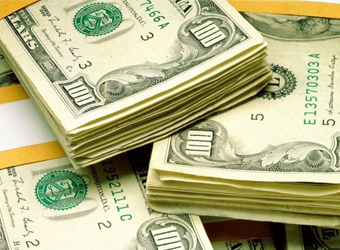The dollar inched down Tuesday, stepping back from recent highs as market attention turns to who will be the next head of the U.S. central bank.
U.S. President Donald Trump told reporters Monday he is “very, very close” to deciding who should chair the Federal Reserve after interviewing five candidates for the position.
These include current Fed Chair Janet Yellen, whose term expires in February, as well as Fed Governor Jerome Powell, Stanford University economist John Taylor, Trump’s chief economic advisor Gary Cohn, and former Fed Governor Kevin Warsh.
“It’s a big question for the markets. It’s one thing to speculate about it,but it’s another to take an FX position,” said Bart Wakabayashi, branch manager for State Street Bank in Tokyo.
“Still, the rumors trigger some selling and buying, on perceptions of who might be more dovish or more hawkish,” he said.
Investors are also following U.S. tax reform developments. The Senate’s approval of a budget resolution on Friday raised hopes that Trump’s tax plans would move forward this year.
The dollar index, which tracks the greenback against a basket of six major rivals, was down 0.2 percent at 93.741, moving away from 94.017, which had been its highest since Oct. 6.
The dollar inched 0.1 percent lower to 113.35 yen, pulling away from a three-month high of 114.10 yen hit in the wake of Sunday’s general election in Japan.
Prime Minister Shinzo Abe’s coalition scored a decisive victory, reassuring investors that his “Abenomics” policies would continue, including the Bank of Japan’s easy monetary policy.
“The risk-on sentiment has stalled for now,” said Masashi Murata, senior currency strategist at Brown Brothers Harriman in Tokyo.
“The Japanese election result was not so surprising, and was mostly priced in,” he said.
The euro added 0.1 percent to $1.1762, though its gains were seen capped ahead of the European Central Bank’s policy meeting on Thursday, where the authority is expected to signal it will take small steps away from its ultra-easy monetary policy.
Catalonia’s separatist crisis pressured the euro. Madrid has invoked special constitutional powers to dismiss the Catalonian regional government and force elections to counter the independence movement.
A vote in the national Senate to implement direct rule on Catalonia is due on Friday.
The New Zealand dollar, meanwhile, had the rug pulled out from under it after the country’s incoming Labour government laid out its left-leaning policies. It was last down 0.2 percent at $0.6949, within sight of a five-month low of $0.6932 plumbed on Monday.
The policies were seen as unfriendly to foreign investment and immigration, and could weigh on the currency given the country runs a current account deficit.
Source: Reuters


